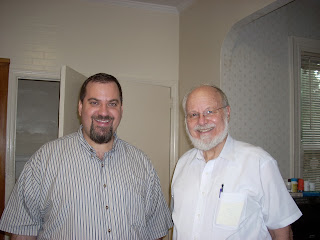Would Ibn Ezra have supported Zev Farber?
 I'm still working on my longer post about my thoughts in response to the current brouhaha about divine authorship of the Torah kicked off by R Zev Farber's article on TheTorah.com. However, in the meantime, here's a couple of quick thoughts that were originally a comment to this post.
I'm still working on my longer post about my thoughts in response to the current brouhaha about divine authorship of the Torah kicked off by R Zev Farber's article on TheTorah.com. However, in the meantime, here's a couple of quick thoughts that were originally a comment to this post.
Rabbi Farber and others have sought to provide support for their views by quoting medieval commentators, such as Ibn Ezra, who questioned the divine authorship of very small parts of the Torah. Criticism of this approach has been along the lines of this sentence, by Yossi Bloch, in his post referenced above:
"There's a world of difference between saying that Abraham didn't have camels or live until 175 and saying that he never existed."
I agree that denying a Sinaitic event, or denying the existence of Moshe or the factuality of the exodus from Egypt is an entirely different level of magnitude than saying that some verses, or chapters, or even all of Devarim were not written by God. Some medieval commentators who may have opined the latter, nonetheless believed deeply that these events occurred and the people existed. The only dispute was did Moshe or even Yehoshua write a small minority of it.
Furthermore, it's obvious that even the most open minded of the Rishonim when it comes to the above would have seen R Farber's views as utmost heresy.
But does that matter?
The point of bringing up ancient or medieval opinions that question the divinity of some parts of the Torah isn't to assert that those commentators would have supported contemporary views that question the entirety of biblical divinity. The point is to show that there's a precedent for modifying beliefs about biblical authorship in the face of contradictory evidence. And that precedent has been shown to exist, no matter the degree.
Ibn Ezra and his rough contemporaries did not question Moshe's existence. In their day, no one did. Their world was divided between Christendom and Islam, with Jews on the fringes. In that world, Moshe's existence was history, and no one doubted it. Who knows what they would have believed the same evidence available to us today? And faced with new evidence today, is there room in traditional Judaism to follow the spirit of Ibn Ezra, even while espousing views he would have considered unacceptable?

As I replied on my post http://dovbear.blogspot.co.il/2013/08/what-proof-is-torah.html, I think that wondering about what ibn Ezra might have done is ultimately a thought experiment. What is more concerning for me is that in this debate (I didn't even reference R. Farber in that piece), the 8th Maimonidean principle has been misrepresented, so as to discredit it (RZF's defenders) or RZF himself (his attackers). That upsets me.
ReplyDelete